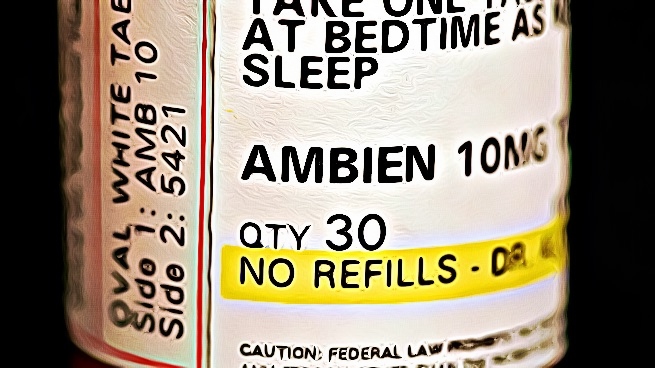Ambien is the commercial name for a drug called Zolpidem, which is used as a short-term treatment for insomnia. It is sold under different names and brands as well, such as Intermezzo, Edluar, and Zolpimist. It also comes in an extended-release form known as Ambien CR. This is coated with a layer that slowly dissolves to reveal the active ingredients within, delaying the effects.
It falls under a classification of drugs available on the market known as sedative-hypnotics. It interacts with the brain to produce a calming effect, which is why it is often used recreationally.
The Ambien High
Taking this drug in appropriate amounts as prescribed by your doctor is not necessarily dangerous. It has even been known to solve sleep problems in as little as 7 to 10 days. In some cases, it might cause strange nighttime side effects such as sleepwalking, but this is increasingly rare.
Though a select few do experience mild versions of the Ambien high and euphoria upon taking it as a sleep aid, it only occurs in roughly 1% of users. And even then, one only experiences a high when the drug is taken in higher doses and for the wrong purposes.

Recreational Ambien users have been known to experience feelings of euphoria, psychedelic trips, and vivid hallucinations. It has also been known to induce impulsive, risk-taking behavior, delusions, and even amnesia. More concrete manifestations of an Ambien high are:
- Sudden affection
- Light feelings
- Slurred speech
- Pounding sensation
- Sound perception disturbances
- Vivid movements in the peripheral vision.
This drug itself takes around 15 minutes to kick in, and about 1 to 2.5 hours to peak. As little as two to three of these pills can generate these intense effects, provided that the user manages to stay awake beyond the first few minutes. Some people even crush up the pills and snort them to produce a faster effect. It is usually taken as a more potent alternative to alcohol, especially since you won’t have to consume as much of the substance to recreate those effects.
Many users claim that they take it as a safer alternative to LSD or shrooms. So go so far as to say that the hallucinogenic effects are far more intense on Ambien than either of those substances.
Anecdotal evidence surrounding Ambien-induced experiences all share a theme of bizarre, unpredictable behavior born out of impaired judgment and reduced impulse control. Users have also reported that many of the things they were said to have done while high on Ambien were things they could not remember. Depending on the underlying mental and psychological state of the user, Ambien could also elicit immoral and violent behavior.
Ambien has a behavioral effect because of the way it induces sleep. The drug tricks the brain into falling asleep by slowing down brain activity, helping you fall asleep faster. It is theorized by several studies that bypassing sleep with the Ambien in your system confuses your brain into entering the REM state while you’re still awake. In essence, the hallucinations you would experience are the brain dreaming while awake.
Another theory is that the high from Ambien is essentially drug-induced sleep deprivation psychosis. The theory is that the Zolpidem in your system makes the brain desperate enough for sleep to think that it has not been asleep for quite a long time.
Ambien Side Effects
There is not enough evidence on the side effects of recreational Ambien use, but there is consensus among users and those who have experienced high from this drug that it does recreate the effects of excessive alcohol consumption, with some unusual and strange conditions and behaviors.
Some physical manifestation of Ambien misuse are:
- Dry mouth
- Burning sensations or numbness in the feet, arms, hands, or legs
- Itching or pain in the ears
- Difficulty balancing
- Vomiting
- Drowsiness.
The fact that Ambien interacts with the brain also creates some troubling side effects on the central nervous system. Of these, some of the more well-known ones include:
- Blackouts
- Impaired judgment
- Nightmares
- Delusions
- Sleepwalking and doing other activities while asleep.
How Long Does Ambien Last
As we’ve mentioned before, Ambien can take about 15 minutes to take effect and 1 to 2.5 hours to peak. This depends on whether the person took a quick-release or the delayed-release version of this drug. People have also reported that its effects manifest more quickly if taken on an empty stomach.
The substance has a halflife (the time it takes a body to rid itself of half the dose taken) of about 2.5 to 3 hours, which means it is metabolized and excreted rather quickly from the system.
This high lasts roughly five hours. Depending on the amount taken, it can be detected in the blood for up to 72 hours in the urine and 48 hours in blood. In the hair, it can stay for as long as five weeks, which is relatively short compared to other substances. These detection periods are the same for users taking it therapeutically and recreationally.
All of this, of course, is subject to a few other factors in the user’s physiology, such as:
- Age
- Sex
- Weight
- Liver and kidney function
- Metabolism
- Underlying and pre-existing medical conditions.
Is Ambien Addictive?
The short answer: maybe.
Initial studies have shown that Ambien has a low risk for dependence, which is why it is available as a prescription drug. Initial clinical trials even showed that it is clinically effective, and thought to be safer than benzodiazepines. The experts behind these studies even reported that there is no evidence for the potential for abuse.

That being said, the World Health Organization does consider Zolpidem products such as Ambien to have a frequency of abuse similar to that of benzodiazepines. Cases of dependence have been reported all over the world. Whether this addiction is to the chemical or a behavioral dependence remains to be seen.
More research is needed to determine the science behind the addictive and dependency-inducing nature of the drug. As of now, there are few procedures designed for addiction treatment to Ambien and other Zolpidem-based drugs.
Final Thoughts
While there is still some debate as to the addictive nature of Ambien and similar drugs, it is still better to be safe. Take it only as prescribed by a doctor. Should any unusual side effects come up, consult your healthcare provider before continuing. Your body might have a predisposition for dependence on the drug.
Though Ambien is still classified as safe to use, this classification is predicated on the assumption that it will be used as prescribed. It should never be used recreationally, and taking more of it does not make it more effective as a sleep aid. All this does is unlock side effects that are not meant to be experienced.
Because there is insufficient data on the long-term effects of recreational Ambien use,. there is no predicting the long-term side effects of this drug. This does not mean, however, that there aren’t any to worry about. This should be a cause for concern as the drug might wreak havoc on a body and mind in unexpected ways.
Sources:
https://www.ncbi.nlm.nih.gov/pmc/articles/PMC2000636/




